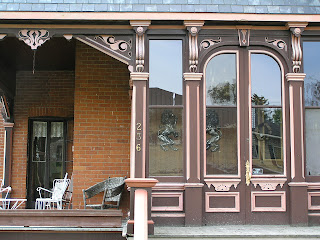
The Second Empire style originated in France under the reign of Emperor Napoleon III. It quickly became popular and spread to England and later North America. Originally favoured for public and civic buildings, this dramatic and colourful style was adopted for residences and was


What to look for (clues)
- The top story is a continuation of the shingled, flat roof (mansard).
- Large windows with elaborate mouldings poke through the top story. Other windows, in a variety of shapes, grace the rest of the building.
- This heavily decorated, large building may be balanced or wildly asymmetrical. Protrusions commonly stick out from the front and sides of the house.
- The brackets on the large eaves are usually paired.
Where to find it
The style is common and can be found, I believe, pretty well throughout Canada. Simpler versions have the mansard roof on all 4 sides, except in Quebec and New Brunswick, where some versions have the mansard only at the sides and the house looks like it is wearing a toupee! There are also samples where the mansard appears only at the front and back.
Plain, smaller, modern versions appear in Ontario suburbs. I’ll do a later study of these under the name ‘Mansards’. Happily, the older Second Empire style has made a recent return in Waterloo County in the form of senior homes and a hotel.
The top and bottom pictures are from a delightful Second Empire in St. Marys. The next two photos were taken in Paris. The massive stone Second Empire lives in Kingston.



No comments:
Post a Comment
Thanks for commenting. Please leave a name and email address so that I can reply back.
Note: Only a member of this blog may post a comment.